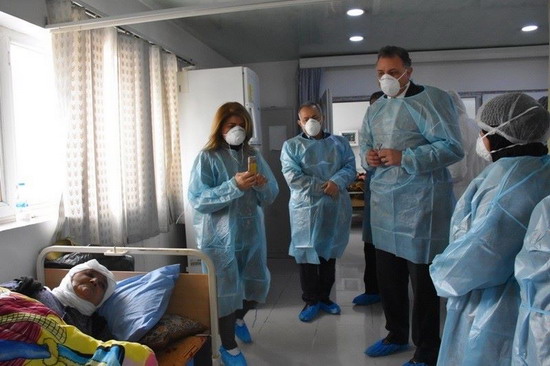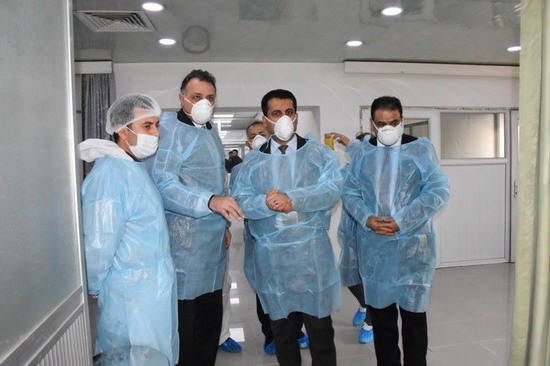 WHO Representative in Iraq visits isolation unit in Al Jumhury teaching hospital in Erbil to assess the facility's capacity to handle the increase in the number of seasonal influenza cases
WHO Representative in Iraq visits isolation unit in Al Jumhury teaching hospital in Erbil to assess the facility's capacity to handle the increase in the number of seasonal influenza cases
Erbil, Iraq, 14 January 2020 – Technical teams from the World Health Organization (WHO) and the Ministry of Health in Kurdistan region of Iraq visited the WHO-supported isolation unit in Al Jumhury Teaching Hospital in Erbil on 12 January 2020. The teams assessed the preparedness of the facility and capacity of its isolation unit to accommodate seasonal influenza cases which have increased as temperatures have dropped in the Region.
As of 12 January, this year, 7 H1N1 patients were reported positive by the facility, which resulted in 3 deaths identified as an individual from Mosul, a Syrian refugee, and a member of the hosting community. “I had a fruitful meeting with His Excellency the Minister of Health in the Kurdistan region on 12 January and was pleased to accompany him in a field visit to Al Jumhury Teaching Hospital to evaluate the facility's preparedness to deal with the increase in cases of influenza in the governorate,” said Dr Adham Rashad Ismail Abdel Moniem, WHO Representative in Iraq. “WHO stands ready to support the Ministry of Health in Kurdistan and build national health capacities on early detection and response to communicable diseases, including all types of seasonal pandemics,” Dr Abdel Moniem added.
 WHO Representative (second left) and Minister of Health of the Kurdistan region in Iraq Dr Saman Hussein Muhammad (second right) visit the isolation unit
WHO Representative (second left) and Minister of Health of the Kurdistan region in Iraq Dr Saman Hussein Muhammad (second right) visit the isolation unit
Al Jumhury Teaching Hospital is the only secondary health care facility serving the population of Erbil of approximately 940 000, in addition to 222 162 internally displaced people and 124 182 Syrian refugees, according to the International Organization for Migration's Displacement Tracking Matrix.
The isolation unit in the hospital is one of 4 units established with the support of WHO in Iraq during the H1N1 influenza pandemic in 2009. The other 3 units were established in Baghdad, Ninewa and Basra governorates within the same period.
WHO has previously provided support through the comprehensive provision of medical equipment and supplies, in addition to a wide-ranging training programme for Erbil Directorate of Health staff as part of the preparedness plan to respond to the influenza pandemic emergency in the Region in 2009.
The 10-bed unit is currently used to treat communicable diseases, such as measles, haemorrhagic fever, hepatitis C and others.
Related link
International Organization for Migration's Displacement Tracking Matrix




